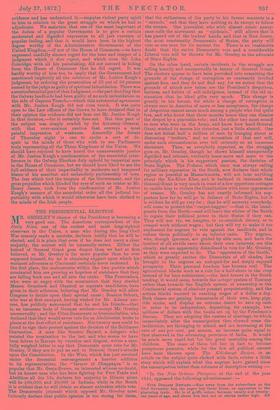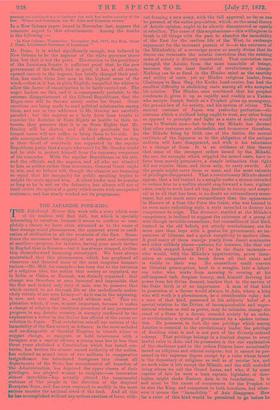THE PRESIDENTIAL ELECTION.
MR. GREELEY'S chance of the Presidency is becoming a very good one. The American correspondent of the Daily News, one of the coolest and most long-sighted observers in the Union, a man who during the long Civil War scarcely made a mistake, declares boldly that he will be elected, and it is plain that even if he does not carry a clear majority, the contest will be unusually severe. Either the hatred of General Grant goes deeper than we had at first believed, or Mr. Greeley is far more popular than he ever supposed himself, for he is obtaining support upon which his warmest advocates at Cincinnati certainly never reckoned. In the first place, the malcontents within the two parties which nominated him are growing so hopeless of resistance that they are falling back one and all into the ranks. The Freetraders, who were so angry with the nomination that they started Messrs. Groesbeck and Olmsted as separate candidates, have given in their adhesion, believing that Mr. Greeley will allow Congress to decide upon their special cause ; Senator Schurz, who was at first annoyed, having wished for Mr. Adams' suc- cess, has publicly announced that he and his friends—that is, an immense body of German settlers—accept Mr. Greeley unreservedly ; and the Ultra-Democrats or Irreconcilables, who declared that they would never vote for an Abolitionist, broke to pieces at the first effort of resistance. Not twenty men could be found to sign their protest against the decision of the Baltimore Convention. A man like Senator Bayard, a delegate who resisted the nomination to the last, and who seems to have been driven to Europe by vexation and disgust, writes a care- fully weighed letter to say that Democrats must vote for Mr. Greeley, if they are to put an end to General Grant's attacks upon the Constitution. In the West, which has just received under the decennial rearrangement a heavier addition to its representatives, the " farmer of Chappaqua " is so popular that Mr. Gratz-Brown, an interested witness no doubt, but an honest man who has been fighting for Free Trade and Abolition all his life, declares his majority in Illinois alone will be-100,000, and 20,000 in Indiana, while in the South it is evident that he will obtain an almost unbroken white vote. The Democratic journals which opposed Mr. Greeley most furiously declare that public opinion is too strong for them,
that the enthusiasm of the party in his favour amounts to a " miracle," and that they have nothing to do except to follow the stream. Oae journalist, who with almost comic annoy- ance calls the movement an " epidemic," still allows that it has passed out of the leaders' hands, and that in New Jersey, the most consistently Democratic of States, the party will vote as one man for its ancient foe. There is no reasonable doubt that the entire Democratic vote and a considerable Liberal vote will be thrown for Mr. Greeley as the advocate of State Rights.
On the other hand, certain incidents in the struggle are telling heavily and unexpectedly in favour of General Grant. The electors appear to have been provoked into examining the grounds of the charge of corruption so constantly levelled against him, and they do not find any, for we notice that the grounds of attack now taken are the President's despotism, laziness, and habits of self-indulgence, instead of the old in- sinuation that he liked gifts very much. This change is greatly in his favour, for while a charge of corruption is always sure in America of more or less acceptance, the charge of despotism cannot mean much among a people who feel quite free, and who know that three months hence they can dismiss the despot by a peaceable vote ; and the other two must sound to men who were in the Army, and know how hard General Grant worked to secure his victories, just a little absurd. One does not defeat half a million of men by lounging about or discussing "trotters," and no accusation of that sort will, under such circumstances, ever tell seriously on an immense electorate. Then, as everybody expected, as the straggle goes on, Mr. Greeley, though he shows himself unexpectedly dignified and reticent, evidently leans more and more to the principle which is his supporters' passion, the doctrine of State Rights. The Tribune, which once was always calling for military repression in the South, now declares that whole region as peaceful as Massachusetts, will not hear anything about the Ku-Klux Klan, and is inclined to insinuate that General Grant is very much in want of a few opportune outrages to enable him to violate the Constitution with some appearance of reason. Mr. Greeley has not exactly informed his sup- porters how far he will go in defence of State Rights, but it is evident he will go very far ; that he will amnesty everybody, will cease to protect the "carpet-baggers"—that is, the immi- grants from the North—and will leave the whites of the South to regain their political power in their States if they can. They will not try, we imagine, to re-establish slavery, or to compel work without wages ; but they will try to make it too unpleasant for negroes to vote against the landlords, and to reduce them politically to an inferior caste. The negroes, who, though ignorant, are guided by able men, and have the instinct of all servile races about their own interests, see this clearly, and are apparently disinclined to vote for Mr. Greeley, as they were expected to do. The "oppression of the South," which so greatly excites the Democrats of all shades, has brought to the negroes an unhoped-for and deeply enjoyed prosperity. Their personal freedom has become real. The agricultural blacks work as a rule for a half-share in the crop instead of for bare subsistence,—the land tenure in the South tending, it would seem, towards the metayer system of Tuscany rather than towards the English system of ownership or the Continental system of absolute peasant proprietorship, and the artisan blacks succeed in exacting wages of a dollar a day. Both classes are gaining homesteads of their own, keep pigs, ride mules, and display an extreme desire to save up cash in order to be independent, depositing, for example, two millions of dollars with the banks set up by the Freedmen's Bureau. They are adopting the custom of marriage, to which immediately after the emancipation they showed some dis- inclination, are thronging to school, and are increasing at the rate of one per cent. per annum, an increase quite equal to that observed in the advancing provinces of India. It would be much more rapid but for the great mortality among the children. The mass of them bid fair in fact to become prosperous peasants, while for the few all political careers have been thrown open. The Edinburgh Review, in an article on the subject quite choked with facts, relates a little story which will explain what the negroes have gained since the emancipation better than columns of descriptive writing :—
" In the New Orleans Picayune, at the end of the year 1841, appeared the following advertisement
'I'm DOLLARS REWARD. —Ran away from the subscribers on the 23rd November last, the negro boy Oscar Dunn, an apprentice to the plastering trade. He is of griffe colour, between twenty and twenty- one years of age, and about five feet ten or eleven inches high. All persons are cautioned not to harbour the said boy under penalty of the law. Wilson and Patterson, eon St. John and Common streets.'
In a New Orleans paper, issued in November last, appears the romantic sequel to this advertisement. Among the deaths is the following :—
In New Orleans, Wednesday. November 2nd, 1871, the Hon. Oscar J. Dunn, Lieutenant-Governor of Louisiana.'" Mr. Dunn, it is added significantly enough, was believed in New Orleans to be the superior of the white governor above him, but that is not the point. His election to the presidency of the Louisiana Senate is sufficient proof that, be the new government of the South bad or good, it has, at all events, opened careers to the negroes, has totally changed their posi- tion, has made them free men in the highest sense of the word,—that is, it has, in plain English, compelled the whites to allow the decree of emancipation to be fairly carried out. The negro leaders see this, and it is consequently probable, to the extreme disappointment of the Liberal Republicans, that the Negro vote will be thrown nearly entire for Grant. Great exertions are being made to send political missionaries among them, and one or two addresses to Mr. Greeley are carefully paraded ; but the negroes as a body have been taught to consider the doctrine of State Rights as hostile to their in- terests, they perceive that it is on State Rights that Mr. Greeley will be elected, and all their gratitude for his former career will not suffice to bring them to his side. An able correspondent of the Nation indeed affirms that so deep is their dread of everybody not supported by the regular Republican party, that a negro who voted for Mr. Greeley would not be able to protect himself from the summary vengeance of his comrades. With the regular Republicans on his side, and the officials, and the negroes, and all who are attached to him as soldier rather than statesman, General Grant ought to win, and we believe will, though the chances are becoming so equal that his incapacity for public speaking begins to weight the scale against him. A silent leader may be popular as long as he is not on the defensive, but silence will not of itself revive the spirits of a party which meets with unexpected resistance, and has nearly worked out its programme.



































 Previous page
Previous page